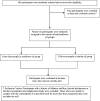How canola and sunflower oils affect lipid profile and anthropometric parameters of participants with dyslipidemia
- PMID: 28638812
- PMCID: PMC5473013
- DOI: 10.18869/mjiri.31.5
How canola and sunflower oils affect lipid profile and anthropometric parameters of participants with dyslipidemia
Abstract
Background: Restricted intakes of saturated and trans-fatty acids and replacement with poly or monounsaturated fatty acids are emphasized in healthy diets. This study evaluates the effects of a six-month consumption of canola oil compared to sunflower oil on lipid profile and anthropometric parameters of people affected by dyslipidemia. Methods: This randomized controlled trial was conducted on 96 patients with dyslipidemia, who were randomly assigned into canola oil or the sunflower oil groups. The participants were instructed to record the contents of their daily meals, beverages, fruits, and snacks a day before treatment, at the second clinic visit, in the third month, and at the end of study (i.e., six months). Lipid profile and anthropometric parameters were compared between the two groups. Student t-test or Mann Whitney U test was used for statistical comparisons of variables between groups. Multivariate analysis was performed to adjust the confounding factor effects. Results: Of the enrolled participants, 44 (45.8%) were on sunflower oil diet and 52 (54.2%) on canola oil diet. We observed no change in anthropometric parameters and thus no significant difference between the two groups (p>0.05). Significant reductions in LDL-C (p<0.001), total cholesterol (p<0.001) and triglyceride levels (p<0.001), and significant elevation in HDL-C (p=0.008) were observed in canola oil group, as well as those who used sunflower oil. Conclusion: Dietary fats in the form of canola oil or sunflower oil effectively lower the serum cholesterol, LDL-C and triglyceride concentrations. They also result in an increase in serum concentration of HDL-C. These oils, however, did not modify general anthropometric parameters.
Keywords: Anthropometric Parameters; Canola Oil; Dyslipidemia; Lipid Profile; Sunflower Oil.
Similar articles
-
The effects of canola and olive oils consumption compared to sunflower oil, on lipid profile and hepatic steatosis in women with polycystic ovarian syndrome: a randomized controlled trial.Lipids Health Dis. 2021 Jan 29;20(1):7. doi: 10.1186/s12944-021-01433-9. Lipids Health Dis. 2021. PMID: 33514384 Free PMC article. Clinical Trial.
-
Rice bran oil and canola oil improve blood lipids compared to sunflower oil in women with type 2 diabetes: A randomized, single-blind, controlled trial.J Clin Lipidol. 2016 Mar-Apr;10(2):299-305. doi: 10.1016/j.jacl.2015.11.016. Epub 2015 Dec 7. J Clin Lipidol. 2016. PMID: 27055960 Clinical Trial.
-
Daily consumption of γ-oryzanol-fortified canola oil, compared with unfortified canola and sunflower oils, resulted in a better improvement of certain cardiometabolic biomarkers of adult subjects with type 2 diabetes: a randomized controlled clinical trial.Eur J Med Res. 2023 Oct 10;28(1):416. doi: 10.1186/s40001-023-01409-8. Eur J Med Res. 2023. PMID: 37817285 Free PMC article. Clinical Trial.
-
Balance of unsaturated fatty acids is important to a cholesterol-lowering diet: comparison of mid-oleic sunflower oil and olive oil on cardiovascular disease risk factors.J Am Diet Assoc. 2005 Jul;105(7):1080-6. doi: 10.1016/j.jada.2005.04.009. J Am Diet Assoc. 2005. PMID: 15983524 Clinical Trial.
-
Evidence of health benefits of canola oil.Nutr Rev. 2013 Jun;71(6):370-85. doi: 10.1111/nure.12033. Epub 2013 May 2. Nutr Rev. 2013. PMID: 23731447 Free PMC article. Review.
Cited by
-
Mushroom-Legume-Based Minced Meat: Physico-Chemical and Sensory Properties.Foods. 2023 May 23;12(11):2094. doi: 10.3390/foods12112094. Foods. 2023. PMID: 37297339 Free PMC article.
-
Association between Different Types of Edible Oils and Anthropometric Indices Mood, and Appetite among Women.Int J Clin Pract. 2022 Oct 19;2022:1233748. doi: 10.1155/2022/1233748. eCollection 2022. Int J Clin Pract. 2022. PMID: 36320895 Free PMC article.
-
RNA-seq transcriptome profiling of pigs' liver in response to diet with different sources of fatty acids.Front Genet. 2023 Jan 25;14:1053021. doi: 10.3389/fgene.2023.1053021. eCollection 2023. Front Genet. 2023. PMID: 36816031 Free PMC article.
-
Olive Pomace Oil versus High Oleic Sunflower Oil and Sunflower Oil: A Comparative Study in Healthy and Cardiovascular Risk Humans.Foods. 2022 Jul 22;11(15):2186. doi: 10.3390/foods11152186. Foods. 2022. PMID: 35892771 Free PMC article.
-
Effects of canola oil on body weight and composition in adults: an updated systematic review and meta-analysis of 32 randomized controlled trials.Nutr J. 2025 Apr 8;24(1):55. doi: 10.1186/s12937-025-01117-5. Nutr J. 2025. PMID: 40200305 Free PMC article.
References
-
- Akram Shad M, Iqbal T, Hussain Shah M. Vegetable oils and dyslipidemia. Pak J Med Sci. 2003;19(1):45–51.
-
- Sitia S, Tomasoni L, Atzeni F, Ambrosio G. et al. From endothelial dysfunction to atherosclerosis. Autoimmun Rev. 2010 Oct;9(12):830–4. - PubMed
-
- Hoffman R, Gerber M. Can rapeseed oil replace olive oil as part of a Mediterranean-style diet? Br J Nutri. 2014;112:1882–1895. - PubMed
-
- BesterD BesterD, Esterhuyse AJ, Truter EJ, Rooyen JV. Cardiovascular effects of edible oils: a comparison between four popular edible oils. Nutr Res Rev. 2010;23:334–348. - PubMed
LinkOut - more resources
Full Text Sources
Other Literature Sources
Medical

